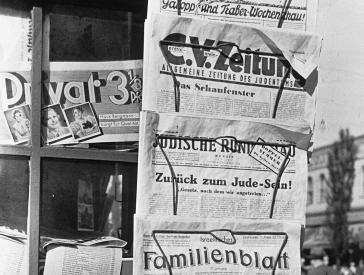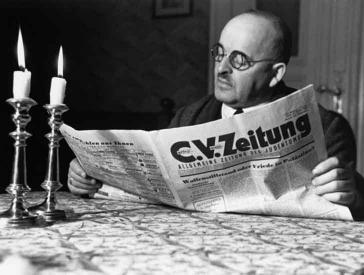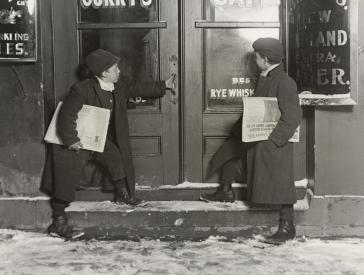Cultural Program in November 2013
Press Invitation
Press Release, Tue 29 Oct 2013
The first retrospective on photographer Fred Stein opens on 21 November. Among the 130 images are portraits of Hannah Arendt, Marlene Dietrich and Albert Einstein as well as street views from Paris and New York. You will receive an invitation to the press conference shortly.
- Kontakt
-
Press office
T +49 (0)30 259 93 419
presse@jmberlin.de
- Address
Jewish Museum Berlin Foundation
Lindenstraße 9–14
10969 Berlin
Special Exhibition: "In an Instant. Photographs by Fred Stein"
22 November 2013 – 23 March 2014
In an Instant. Photographs by Fred Stein
Press conference: 21 November, 11 am
Born as son of a rabbi in Dresden in 1909, Fred Stein qualified as a lawyer there and then emigrated to Paris in 1933 and to New York in 1941. In search of a new professional perspective, he opted under the difficult conditions of exile for photography, which had been his hobby until then.
Besides numerous street views of Paris and New York, Fred Stein made over 1,200 portraits, among them well-known personalities such as Hannah Arendt, Albert Einstein, Thomas Mann, Salvador Dalí, Marlene Dietrich, and Willy Brandt.
He did not – like many other photographers – photograph in the studio with a big camera, but strolled through the streets with his miniature camera capturing the city and its people in brief but decisive instants. His special perspective combines his interest in everyday life with his sense for the extraordinary moment and has his particular and charismatic humor shining through time and again.
The exhibition’s more than 130 b/w photographs show a comprehensive retrospective of Fred Stone for the first time in Germany, thus making this complex work accessible to a wider public.
Location: Libeskind Building, ground level, Eric F. Ross Gallery
Admission: with the museum ticket: 7 €, reduced rate 3.50 euros
Academy Programs Migration and Diversity of the Jewish Museum Berlin
22 November
Panel Discussion
Quo vadis Migration Politics?
Germany is an immigrant society with open borders within the EU and transnational migratory flows beyond Europe. People come and go, the population is plural, multi-religious, and multi-ethnic. However, the approaches of integration and migration policies often stem from an outdated paradigm: a homogeneous host society into which immigrants must be integrated.
At the first joint meeting of the Academy Programs Migration and Diversity and the Migration Council, science meets politics – migration researchers discuss with policy makers after the election how new approaches to migration and integration policy in Germany could look.
Chair: Yasemin Shooman (Head of Academy Programs of Migration and Diversity)
Participants:
Aleksandra Lewicki (University of Bristol), Dietrich Thränhardt (Universität Münster), Aygül Özkan (Ministerin a.D. und Mitglied des CDU-Bundesvorstands), Miguel Vicente (Beauftragter der Landesregierung Rheinland-Pfalz für Migration und Integration)
Location: Academy Hall
Time: 6.30 pm
Admission: free
Bookings on tel. +49 (0)30 25 993 488 or reservierung@jmberlin.de
Book Presentations, Conferences and Panel Discussions
5 November
Book Presentation
Neue Städte für einen neuen Staat (New towns for a new state)
Understand Israel? Even 65 years after the founding of the state, little is known about the background and concepts of the development work undertaken in Israel and its parallels to the rebuilding of the Federal Republic of Germany. "Neue Städte für einen neuen Staat" (ed. Karin Wilhelm, Kerstin Gust) presents for the first time the closely intertwined developments since 1948 and takes a critical look at mutual perception, at perspectives and projections.
Attended by: Katharina Hacker (author), Karin Wilhelm and Moshe Zuckermann (sociologist and philosopher, Tel Aviv University), Chair: Kerstin Gust
Location: Old Building, ground level, Auditorium
Time: 7 pm
Admission: free
8 and 9 November
Conference in English
Antisemitism in Europe Today: the Phenomena, the Conflicts
Antisemitism expresses itself in different forms in today's Europe. The conference will present these different expressions of antisemitism in its European dimensions as well as political and cultural conflicts which have evolved around them. By presenting different international approaches in the research of antisemitism the organizers aim to connect discussions that, as yet, are often led in limited national contexts only. In five panel sessions specific aspects of antisemitism will be presented and discussed with the audience. The organizers are inviting an expert community, educators who work in the field of civic education, teachers and students.
In cooperation with the Foundation Remembrance, Responsibility and Future and the Center for Research on Antisemitism at the Technische Universität Berlin.
Location: Old Building
Entrance: free
8 November
Public Lecture by Brian Klug (in English)
What do we mean when we say ‘antisemitism’?
A precise definition of antisemitism is highly disputed and often sparks heated and polemic debate. British philosopher Brian Klug discusses possibilities to identify antisemitism and traces and positions of various discourses. The sociologist Detlev Claussen will discuss and comment on the lecture.
The lecture is part of the conference "Antisemitism in Europe Today – the Phenomena, the Conflicts" which is organized by the Jewish Museum Berlin, the Foundation Remembrance, Responsibility, and Future and the Center for Research on Antisemitism at the Technische Universität Berlin.
Location: Glass Courtyard, ground level
Time: 7.30 pm
Admission: free
11 November
Rabbi Brandt Lecture 2013: Die Sprache der Judenfeindschaft (The Language of Hostility towards Jews)
Lecture by Monika Schwarz-Friesel
The annual lectures of the Society for Christian-Jewish Cooperation honor Rabbi Dr. h.c. Henry G. Brandt for his impetuses in interreligious dialog. The language and cognitive scientist Professor Monika Schwarz-Friesel talks about the passing on and perpetuating of anti-Jewish stereotypes and resentments. Even today’s speech reflects phrases that were used in the Middle Ages and that during the Nazi era belonged to the standard repertoire of verbal discrimination against Jews.
Professor Monika Schwarz-Friesel is a language and cognitive scientist and has headed the Department of General Linguistics at the Technical University of Berlin since 2010. Her research interests include current verbal anti-Semitism.
A cooperation with the German Coordination Council of the Societies for Christian-Jewish Cooperation (DKR).
Location: Old Building, second level, Great Hall
Time: 5.30 pm
Admission: free
12 November
Book Presentation with the Author and the Actor André Kaminski
Assaf Gavron: Auf fremdem Land (On foreign ground)
Is that really too much to ask? Etaniel Asis just wants a peaceful place where he can grow cherry tomatoes for his wife and keep a goat. But once he has his caravan parked next to a small open field in the middle of the West Bank, other settlers come from his village, a kindergarten and a synagogue spring up and donations from America flow – even though nothing is approved. When an American journalist reports on the settlement, an international crisis arises and Israel’s defense minister has to justify the matter to the USA.
With satirical bite and passionate sincerity, Assaf Gavron tells in his new novel of the absurd reality of life in the occupied territories on the West Bank and how it could come about.
Chair: Sigrid Brinkmann (Deutschlandradio Kultur)
A cooperation with the Literaturhandlung, the Jewish Adult Education Center Berlin and the Luchterhand Literaturverlag
Location: Old Building, second level, Great Hall
Time: 7 pm
Admission: 8 €, reduced rate 6 euros
Bookings on tel. +49 (0)30 8824 250
28 and 29 November
Conference
Shaping Access! More responsibility for cultural heritage
Digitization not only makes the electronic capturing of art and cultural assets possible, but can in future also make them available via the Internet to a wide audience at any time and in any place. How will this digital opening affect the self-image of cultural institutions? What is expected of museums, archives, and libraries and how can they fulfill this responsibility? Experts from culture, politics, and business discuss the manifold effects of digitization and why access to cultural heritage should be a public task.
A cooperation with the Prussian Cultural Heritage Foundation, the Internet & Society Co:llaboratory, the German Digital Library, the iRights.Lab Kultur, the Open Knowledge Foundation Germany and Wikimedia Germany.
Location: Glass Courtyard, Old Building
Time: 10 am to 6 pm
Admission: free
Online Project
Until 31 December 2013
1933. The Beginning of the End of German Jewry
How did the disenfranchisement and persecution begin? Until the end of the year at our online project, you will find historical documents that bear witness to what German Jews experienced day after day.
https://www.jmberlin.de/1933/en




